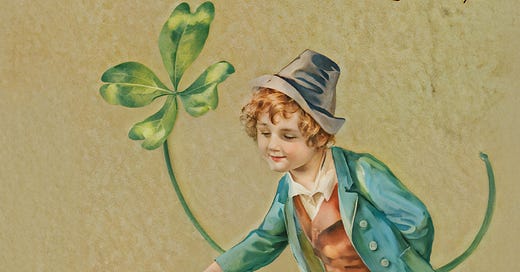May Good Fortune be yours on this Saint Patrick's Day
A few Saint Patrick's Day wishes, along with a bit of history, a song, and one of the best Saint Patrick's Day movies ever made.
They say that Saint Patrick ran the snakes out of Ireland. Truth is, Ireland never had any snakes; the climate doesn’t appeal to them. The snakes that Saint Patrick drove into the ocean refer to the old pagan religions which often revered snakes because of their ability to shed their skin. These faiths Patrick did run out of Ireland, turning the country catholic. However, the Irish never quite turned their backs on their stories and heroes of old. They still love their fairies and boggarts, their banshees and leprechaun.
More about Leprechauns in a moment.
But first, I have a bit of my own family history that goes like this. My great, great, great, great something grandmother put it in her will that she was not to be buried withing a hundred yards of a Catholic. Yes, she was Irish of the orange persuasion, meaning she was from the protestant north and most likely of British origin. I sometimes wonder how she would have felt if she knew that a number of her great great, great something grandchildren would be one day be raised in the Catholic faith.
With that in mind, I thought I would share The Orange and the Green, sung by the Irish Rovers. It tells of a child with a protestant father and a catholic mother, whose upbringing is a total mix-up. It reminds me of my own upbringing, because every Saint Patrick’s day, I felt that I ought to wear orange instead of green, but nobody but my mother understood why. Ah well…
And now for that something more about Leprchauns:
On this Saint Patrick’s Day, I am please to offer you, The Luck of the Irish; a 1948 movie, starring Tyrone Power, Anne Baxter, and Cecil Kellaway as the Leprechaun—in my opinion, the best Leprechaun portrayal ever captured on film. Apparently the Academy of Motion Picture Arts and Sciences agrees with me because they nominated his performance for best supporting actor that year.
If you can’t can’t spare the 99 minutes it takes to watch the film, perhaps you’d like to read a bit of the dialogue from my favorite scene, and then cogitate on it’s meaning as we consider our current leaders:
Fitzgerald: If it happens again, you don’t have to come down after me. There’s such a thing as taking your job too seriously.
Horas: On no sir, not when you’re hearts in your work.
Fitzgerald: It’s just a job Horas.
Horas: No, it’s not. It’s more than that. It’s a life, indeed. When a man enters the personal services of another man, he must be prepared to surrender himself to his vocation. Tis the master who matters, not the man. And soon, if the man takes to his work, the master’s wish will become the man’s wish. The master’s thought, his thought. The master’s soul, his soul. When the master gets hurt, the man will cry out. When the master’s nose itches, twill be the man who sneezes. He will live for his master, not for himself. Perhaps you find it difficult to understand sir because you are a proud free man who wears no man’s collar, and it is for that reason that I’m proud to serve you.
There’s also this priceless piece of dialogue from when Fitzgerald finally realizes that his manservant is really a leprechaun:
Fitzgerald: Aren't you too large to be a Leprechaun?"
Horas: That's a page of my family history we won't go into if you don’t mind.
The film is 99 minutes, black and white, and happens to be one of my favorite. The link I’ve provided has only two brief commercial breaks located about three quarters of the way through the film. Also, during the wedding celebration, when the tenor starts to sing, the sound cuts out for about two minutes, and comes back just in time for you to hear the tenor’s final notes.
So without further ado, curl up on you couch and enjoy:




